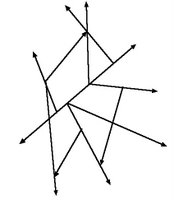Marc Prensky's keynote address
Marc Prensky's Keynote at the NYSCATE Technology Leadership Conference July 18, 2006
These are my notes from the address which are really more like bullet points of things that I really connected to. This is, of course, not the same as being there for others but you may find your own connections with some of these points.
Change is happening more rapidly now than even at the beginning of the 21st century.
Threatening to teachers...empowering to kids. hmmm...
IT power is doubling every year
Interconnected information
Solving problems with the tools we have (pre-21st century) - everything has tools, we learned to use them, help kids learn to use them
Inventing new tools to solve problems - 21st centruy +
When will this change end? There's no destination...
"most of us prefer to walk backwards into the future...." Charles Handy
"Without motivation there is no learning" James Paul Gee
"If a learner is motivated, there's no stopping him" Will Wright
Why educators are having problems
The world is changing
Our students are changing - they are not the ones we were trained to teach
Engagement is changing
In a year (?), our kids are exposed to:
5,000-10,000 hr video games
240,000 emails and IMS
10,000hrs on cell phone
20,000 hr tv
500,000 commercials
5,000 hr reading books
Kids are downloading:
2 billion songs per month
6 billion text messages per day
2 billion ring tones per year
Brains like ours alter profoundly to fit the technologies and practices that surround them. - Andy Clark
Digital Immigrants--->Digital Natives
conventional speed ---> twitch speed
step by step ---> random access
linear processing ---> parallel processing/multitasking
text first ---> graphics first (text backs up image)
work oriented ---> play oriented
stand alone ---> connected
"Students are not just using technology differently today, but are approaching their life and their daily activities differently because of technology." Net Day 2005(06)
communicating
coordinating
searching
sharing
evaluating
analyzing
exchanging
creating
meeting
collecting
learning
Digital immigrants - we will never be in the same place as the kids are where technology is concerned, we leave a foot in the past.
printing out our emails
no instant messaging
not going to the internet first
thinking real life happens only off line
thinking teaching = learning ( not necessarily)
thinking learning has to be work
Learning feels like play when you have engagement.
Today's kids go online - they can ALWAYS find something to do online - they know what engagement feels like, want to feel engaged all the time.
But for lots of kids today, most education is boring even with technology - just because we give them technology doesn't mean they're not bored, we have to use technology in an engaging way. [this is an interesting statement ---we've long been thinking about the fact that using new technology to do old things in old ways doesn't make a difference]
"Going to school is powering down."
Engagement is more important than content for today's kids; even more important than technology
Content will change! Content won't help students continue to learn throughout their lives, but engagement will.
Outside of school, kids are empowered.
What people put into the Internet is more important than what they take out. - Tim Berners-Lee
Young learners are ...hands on, want things to be fun, love to share ("knowledge is power", sharing is power).
Not ADD, but rather EOE (engage me or enrage me)
It's not attention deficit - I'm just not listening!
Dec 2005 Educational Leadership article by Marc Prensky
Kids have to learn about the future on their own
School is - legacy stuff, irrelevant, pushed on them, boring
after school - future learning
Foster this message: we are all learners, we are all teachers
Learn how to teach using tools you can't fully master - tools will come fast and go fast
Coming too fast to master
Teachers need to know - how to teach using tools that are unfamiliar to them and that they can't fully master
So, don't waste your time learning to use new tools because the kids can do it.
As a teacher you need to understand the new technologies so you can teach.... [this was shown as a chart as follows]
Wikipedia
Assign - design a wikipedia entry for...
Evaluate - communication, journalism, use of multimedia, creativity
Teach - search vs. research, fair use vs. plagiarism
Podcasts
Assign - make a podcast about...
Evaluate - communication, journalism, use of multimedia, creativity
Teach - oral vs. written communication
IM
Assign - Desing a class using only IM
Evaluate - usefulness, breadth, depth, originality
Teach - informal vs. formal communication
Phone based cameras
Assign - take and photoshop a picture to best illustrate...
Evaluate - communication, originality, artistry, technique
Teach - pictures vs. words, truth vs manipulation, appropriate vs. inappropriate
Seven key things to take from complex game design:
engagement, gameplay, goals, decisions (give you feedback), leveling up (to get from one level to another, you have to practice), adaptivity (increasing levels of difficulty), iteration (what needs to be changed ?)
Teachers are used to
content first
presentation
linear stories
one thing at a time
inperson
Students
Almost every student already has a powerful computer in their backpack - cell phones, pda's
What can you learn from a cell phone? article on innovateonline
We have to start evaluating kids with THEIR tools.
adopt new attitudes and behaviors - mutual respect, engagement first, valuing what students know and do, create important goals, let students use the technology
share your successes through blogs, wikis, etc - put it on the web
www.timrylands.com
tech leader:
fight hard for the kids - 1:1 computing, email, IM, open Internet, cell phones, success sharing, kids do-teachers teach
continually ask yourself: would the kids be here if they didn't have to be?
No one says it's EASY - it will take a lot of effort, but that's why the kids will thank us when we succeed
www.marcprensky.com
www.socialimpactgames.com
www.gamesparentsteachers.com
www.games2train.com
Questions
Kid's relationships, the way they have relationships is changing
How do we take all the tools that we have to create a "whole"?
If you wanted to make one change in the tech in the schools, what would it be? [this question was posed to two students who were invited to be a part of this conference]
• allow IM with others at school
• without communication -it's frustrating to students
• giving students a common place to communicate (on the Internet)
Understanding how kids think
Cell phones disconnect as well as connect you - cell phones allow you to do other things at the same time


